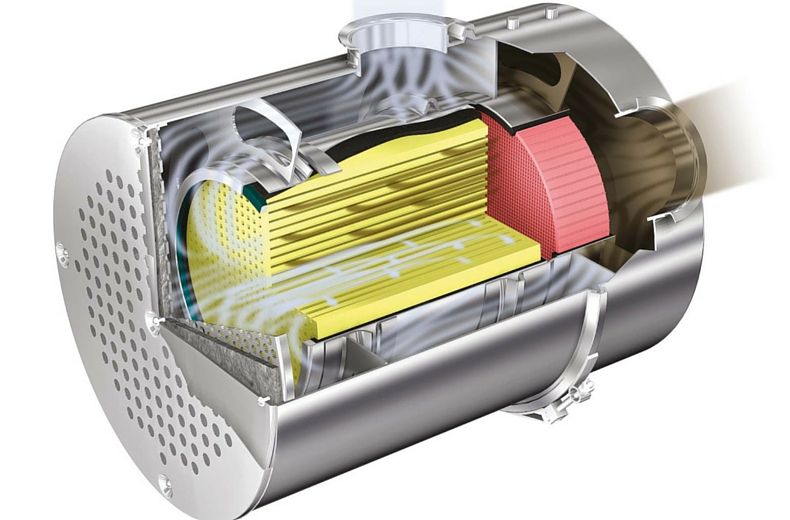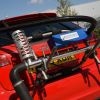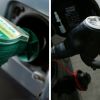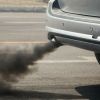Diesel particulate filters have been fitted to diesel-fuel cars for almost two decades now - but if not maintained, or if tampered with there could be serious consequences for your car and the level of harmful emissions it produces.
Here we explain exactly what they are, what they do, why you need them and how to look after them. If you're concerned about your diesel particulate filter contact a local garage or your mobile mechanic.
What is a diesel particulate filter (DPF)?
A diesel particulate filter (DPF) is a filter that captures and stores exhaust soot (some refer to them as soot traps) in order to reduce harmful emissions from diesel cars.
But because they only have a finite capacity, this trapped soot periodically has to be emptied or 'burned off' to regenerate the DPF.
This regeneration process cleanly burns off the excess soot deposited in the filter, reducing the harmful exhaust emission and helps to prevent the tell-tale black smoke you used to see from diesel vehicles, particularly when accelerating.
Euro 5 exhaust emissions legislation introduced in 2009 to help lower car CO2 emissions effectively made DPFs mandatory, and since then all modern diesel cars are fitted with at least one of these devices.
Is it illegal to remove a diesel particulate filter (DPF)?
Yes, it is illegal. Owners face fines if caught (up to £1,000 for cars and £2,500 for vans) and removing a DPF can also invalidate your car insurance policy.
- Did you know that we offer specialist temporary car insurance?
- Exhaust repair
How do I tell if my diesel particulate filter (DPF) is blocked?
If the DPF is becoming clogged with soot or a fault develops in the system, an orange light will typically appear on the dashboard as seen below.

They usually look like this with a piped box that has dots in the middle, although they can slightly vary by manufacturer – check your handbook for more information.

RAC sale – up to 33% off*
• Roadside cover from £5.29 a month†
• We get to most breakdowns in 60 mins or less
• Our patrols fix 4/5 breakdowns on the spot

What causes a diesel particulate filter (DPF) blockage?
Short journeys at low speeds are the prime cause of blocked diesel particulate filters.
This is why car makers often go as far as recommending city-bound or short-hop drivers choose a petrol or electric car instead of diesel.
Other things that are bad for DPFs include poor servicing.
A diesel particulate filter on a poorly serviced car may fail sooner than a well maintained one, generally, they should last for at least 100,000 miles.
It’s important you use the right type of oil as well – some oils contain additives that can actually block filters.
Performance modifications can damage a diesel particulate filter, as can using low-quality fuel and even running the car frequently on a low fuel level as the car may avoid DPF regeneration in order to save fuel.
How do I maintain a diesel particulate filter (DPF)?
The best way to maintain a DPF is to make sure it’s fully able to regenerate itself when it’s full of soot (when the warning light appears).
There are two types of regeneration: passive and active.
Passive DPF regeneration
Passive regeneration occurs when the car is running at speed on long motorway journeys which allows the exhaust temperature to increase to a higher level and cleanly burn off the excess soot in the filter.
So it is advised that drivers regularly give their diesel vehicle a good 30 to 50 minute run at sustained speed on a motorway or A-road to help clear the filter.
However, not all drivers do this type of driving regularly – which is why manufacturers have designed an alternative form of regeneration.
- Engine idling - why it's so harmful and what's being done
- The real facts on 'dirty' diesels
- Euro 1 to Euro 6 guide - find out your car's emissions standard
Active DPF regeneration
Active regeneration means extra fuel is injected automatically, as part of the vehicle's ECU, when a filter reaches a predetermined limit (normally about 45%) to raise the temperature of the exhaust and burn off the stored soot.
Problems can occur, however, if the journey is too short, as the regeneration process may not complete fully.
If this is the case the warning light will continue to show the filter is still partially blocked.
In which case it should be possible to complete a regeneration cycle and clear the warning light by driving for 10 minutes or so at speeds greater than 40mph.
You will know whether active regeneration is taking place by the following symptoms:
- Engine note change
- Cooling fans running
- A slight increase in fuel consumption
- Increased idle speed
- Deactivation of automatic Stop/Start
- A hot, acrid smell from the exhaust
What do I do if neither active nor passive DPF regeneration work?
If your warning light continues to stay on, turns red, or additional DPF lights come on, do not leave it too long before getting it checked out.
More damage can be caused this way and what could be an inexpensive fix can become something much more expensive.
Some garages can clean blocked DPFs, in a process called forced regeneration.
This usually costs around £100 and, while it’s not a 100% guaranteed fix, it’s usually successful in removing the excess soot and allowing the DPF to work and automatically regenerate again.
It’s a failure to correctly regenerate that is the cause of most diesel particulate filter issues: they become blocked, which increases exhaust emissions, stifles engine performance and sometimes even puts the car into a restricted ‘limp-home mode’.
On some models the engine may not restart after a number of miles – again, consult your handbook for details.
Modern diesel car owners thus need to be conscious of the importance of maintaining their diesel particulate filter through driving habits and practices.
Do I need a diesel particulate filter (DPF) to pass the MOT?
A diesel particulate filter check has been part of the MOT test since 2014. If a filter has been removed, the car will fail its MOT.
Removing the DPF will sometimes cause the warning light to glow – and this itself is an MOT failure point: no dashboard warning lights should remain on during the test.
Should I call the RAC if the diesel particulate filter (DPF) light is glowing?
There is no need to call out the RAC if your DPF warning light is glowing.
As mentioned, it can sometimes be rectified by going on a long drive; if it fails to extinguish, take your car to a garage.
Remember, orange dashboard warning lights are advisory; it’s red warning lights that require immediate attention and usually demand you stop the car as soon as possible.
What is the cost of a new diesel particulate filter (DPF)?
Diesel particulate filters are very expensive.
A new one from a car manufacturer can cost £1,000 and £3,500, potentially wiping out the cost savings associated with driving a diesel.
As cars age, the cost of the replacement DPF could be more than the value of the car – and it is older, higher mileage cars that are most likely to require a new DPF.
There are now other suppliers of diesel particulate filters that charge less, but be careful here: they must still have the correct Type Approval or they may not work correctly and end up costing you more in repairs. If you do need a repair, consider using an RAC Approved Garage or RAC Mobile Mechanic.
Get 30 driving tips that will save you money
Running a car isn’t cheap, but there are some easy things you can do to keep your costs down. Get these tips and more useful driving articles sent straight to your inbox now.


How does our breakdown cover measure up?
DPF FAQ
- Is it OK to drive with DPF light on?
No, it is not OK to drive with the DPF (Diesel Particulate Filter) light on. The DPF light indicates that there is an issue with the DPF system, which can lead to increased emissions and reduce engine performance. Additionally, it can cause the engine to overheat and potentially lead to costly damage.
If the DPF light is illuminated, the most important thing to do is to have the system inspected and repaired as soon as possible. The cause of the issue could be something as simple as a clogged filter, or it could be caused by a more serious issue, such as a faulty sensor or broken component.
- How do you clear a DPF?
A Diesel Particulate Filter (DPF) is an important part of a vehicle’s exhaust system, designed to reduce the amount of soot and other particles emitted from the engine. Over time, the DPF can become clogged with these particles, which can cause engine performance issues and even damage the filter itself. Fortunately, there are a few ways to clear a DPF in order to maintain your vehicle’s performance.
The most common method of clearing a DPF is through a process called regeneration. Regeneration is a process in which the engine is made to run at a high temperature in order to burn off the particles trapped in the filter. This process is usually done automatically by the vehicle, but can also be done manually.
Another way to clear a DPF is through a process called forced regeneration. In this process, a special chemical agent is added to the fuel in order to create a high temperature in the engine, which helps to burn off the particles trapped in the filter.
Finally, another way to clear a DPF is through a process called filter replacement. This process involves removing the old filter, cleaning it, and then replacing it with a new one. This is a more costly method, but can be necessary if the filter has become damaged or clogged beyond repair. - What happens when DPF is blocked?
When the DPF becomes blocked, it can cause a variety of problems for the vehicle. The most noticeable symptom is a decrease in performance, as the blocked DPF is unable to properly filter out exhaust particles. This can result in an increase in exhaust smoke, as the particles are not being filtered out.
In addition, a blocked DPF can also cause the check engine light to come on, as the filter is unable to meet the necessary standards for emission control. This can cause the vehicle to fail an emissions test, which will require the DPF to be replaced or repaired.
Also, a blocked DPF can also cause a decrease in fuel efficiency and increase in fuel consumption. This is due to the fact that the filter is unable to do its job properly, which means that more fuel is needed to produce the same amount of power.
Finally, a blocked DPF can also cause damage to the engine, as the blocked filter can cause a build-up of soot and ash. As a result, this can cause a buildup of pressure, which can lead to increased wear and tear on the engine components. - Why does my diesel particulate filter light keep coming on?
There are a few possible causes for this, including oil contamination or an exhaust leak. It could also be due to a poorly tuned engine, or simply because the DPF has reached the end of its life.
In any case, if the DPF light keeps coming on, it’s important to take your car to a mechanic and have them diagnose the problem.
- What is the DPF on a car?
The Diesel Particulate Filter (DPF) is a device that is fitted to the exhaust system of diesel cars in order to reduce the amount of harmful soot and particles produced during the combustion process. The DPF is a vital component in helping to meet current emissions regulations, and as such, it is an important part of a car’s exhaust system. It is also important to ensure that the filter is regularly maintained, as a blocked filter can cause issues with the car’s performance.
- How much does a DPF cost?
The cost of a Diesel Particulate Filter (DPF) varies significantly depending on the make and model of your vehicle. Generally, a DPF will cost between £1000 and £3,000. However, some vehicles may require additional parts and labor to install the DPF, which can significantly increase the price.
- How long does it take to clear a diesel particulate filter?
The amount of time it takes to clear a diesel particulate filter (DPF) depends on the type of filter, the engine’s use, and the mileage driven. Generally, it takes about 500-1,000 miles for a DPF to clear out the collected soot and particulates.
Under normal driving conditions and with a properly functioning DPF, the filter should only need to be cleaned every 20,000 to 40,000 miles.
However, through passive regeneration by driving for 30 to 50 minute run at sustained speed on a motorway or A-road it will help clear the filter.
- Can I clean a DPF myself?
The short answer to this question is no, you should not attempt to clean a Diesel Particulate Filter (DPF) yourself. While the DPF is an important component of your vehicle’s emissions system, it is a complicated and delicate device that should only be handled by a trained and certified mechanic.









